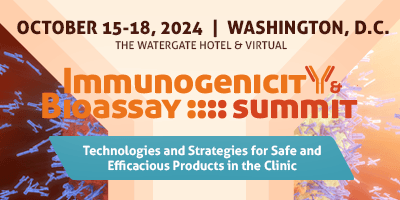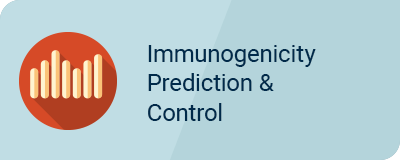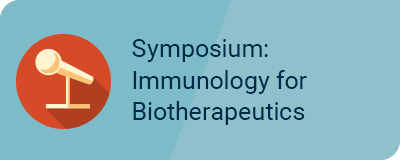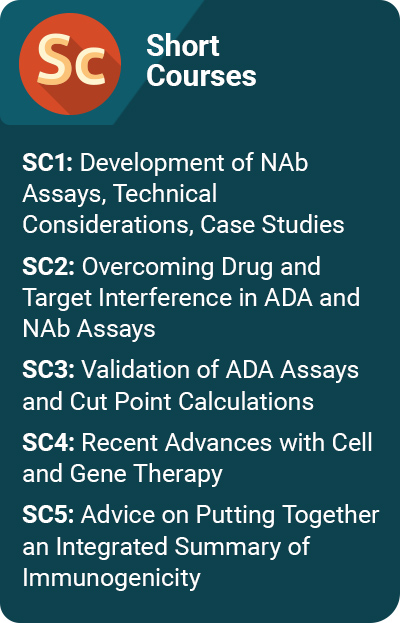2024年FDA推介会
10月16日(三)
8:30 am KEYNOTE PRESENTATION: The Role of Clinical Pharmacology and Clinical Relevance of Immunogenicity Yow-Ming Wang, PhD, Associate Director for Biosimilars and Therapeutic Biologics, CDER, FDA
Yow-Ming Wang, PhD, Associate Director for Biosimilars and Therapeutic Biologics, CDER, FDA
To address the concern of negative impact of immunogenicity on treatment effects, therapeutic drug monitoring has been adopted as a mechanism of patient management in some clinical specialties. Advances in leveraging clinical pharmacology data have offered an option for evaluating clinical impacts. This presentation will discuss the current challenges and potential future directions based on the review experience in the Office of Clinical Pharmacology at the FDA.
- Presenting at: Immunogenicity Assessment & Clinical Relevance
10:45 am Guidance on Immunogenicity in Drug Product Labeling Eric Brodsky, MD, Associate Director, Labelling Policy Team, CDER, FDA
Eric Brodsky, MD, Associate Director, Labelling Policy Team, CDER, FDA
This presentation will discuss incorporating immunogenicity information into the prescribing information for human drugs and biological products.
- Presenting at: Immunogenicity Assessment & Clinical Relevance
11:05 am Immunogenicity of Peptides Mohsen Rajabi Abhari, PhD, Senior Pharmacologist & Lead Biologics, Office of Clinical Pharmacology, FDA CDER
Mohsen Rajabi Abhari, PhD, Senior Pharmacologist & Lead Biologics, Office of Clinical Pharmacology, FDA CDER
- Presenting at: Immunogenicity Assessment & Clinical Relevance
11:25 am Assessing Immunogenicity Using Immune Humanized Mice Kristina Howard, Principal Investigator, Division of Applied Regulatory Science (DARS), CDER, FDA
Kristina Howard, Principal Investigator, Division of Applied Regulatory Science (DARS), CDER, FDA
This talk discusses the use of immune humanized mice to assess immunogenicity in drug development. It explores the methodology for creating and utilizing these mice to mimic human immune responses, providing a valuable preclinical tool for predicting immunogenic reactions to therapeutics. The focus is on enhancing the accuracy of immunogenicity assessments, which is crucial for the safety and efficacy of new drugs, particularly biologics and biosimilars.
- Presenting at: Immunogenicity Assessment & Clinical Relevance
1:20 pm Immunogenicity Assessment of Gene Therapy Products Anurag Sharma, PhD, Gene Therapy Reviewer, CBER, FDA
Anurag Sharma, PhD, Gene Therapy Reviewer, CBER, FDA
Despite great promise, the immunogenicity of gene therapies remains one of the biggest challenges. Immunogenicity can impact the safety, efficacy, and long-term durability of gene therapies. Addressing immunogenicity-associated challenges is critical to realizing the full potential of these life-saving therapies. In my talk, I will discuss FDA’s perspective on the immunogenicity associated with gene therapies.
- Presenting at: Immunogenicity Assessment & Clinical Relevance
1:50 pm Rational Immunosilencing of a Promiscuous T Cell Epitope in the Capsid of an Adeno-Associated Virus Sojin Bing, PhD, Staff Fellow, Office of Tissues & Advanced Therapies, FDA CBER
Sojin Bing, PhD, Staff Fellow, Office of Tissues & Advanced Therapies, FDA CBER
Despite the high safety profile demonstrated in clinical trials, adeno-associated virus (AAV)-mediated gene therapy still faces considerable obstacles due to its immunogenicity. Here, by leveraging ex vivo T cell assay, the prediction of epitope binding to major histocompatibility complex Class-II alleles, sequence-conservation analysis in AAV phylogeny, and site-directed mutagenesis, we show that the replacement of amino acid residues in a promiscuous and most immunodominant T cell epitope in the AAV9 capsid with AAV5 sequences, abrogates the immune responses of peripheral blood mononuclear cells to the chimeric vector while preserving its functions, potency, cellular specificity, transduction efficacy, and biodistribution.
- Presenting at: Immunogenicity Assessment & Clinical Relevance
10月17日(四)
4:00 pm KEYNOTE PRESENTATION: What Information Can MHC Associated Peptide Proteomics (MAPPs) Assays Provide during Immunogenicity Risk Assessment of Therapeutic Proteins and Novel Modalities? Zuben Sauna, PhD, Director, Division of Hemostasis, CBER, FDA
Zuben Sauna, PhD, Director, Division of Hemostasis, CBER, FDA
In vitro assays that assess the potential immunogenicity of protein therapeutics are useful during drug development. I will provide specific examples of the application of MAPPs in assessing the immunogenicity of protein therapeutics (Factor VIIa and Factor VIII). I will also discuss MAPPs assays in the context of novel modalities. Many novel modalities rely on intracellular protein synthesis. Novel workflows for MAPPs assays to capture these events will be provided.
- Presenting at: Immunogenicity Prediction & Control
10月18日(五)
8:30 am Biologist and Biostatistician Regulatory Perspectives on Development of Bioassays to Support CGT Products Leslie Wagner, Consumer Safety Officer, FDA CBER
Leslie Wagner, Consumer Safety Officer, FDA CBER
- Presenting at: Optimizing Bioassays for Biologics
8:30 am Understanding and Circumventing the Immune Responses to Approved Protein Therapeutics Daniel LaGasse, PhD, Research Regulator, CBER, FDA
Daniel LaGasse, PhD, Research Regulator, CBER, FDA
Immunogenicity can compromise the safety and/or efficacy of therapeutic protein products, and is a priority issue for regulatory agencies. In addition to poor patient outcomes, the social and economic costs associated with neutralizing antibodies are considerable. In this presentation, I survey the immunogenicity of approved therapeutic proteins, discuss strategies for clinical management of immunogenicity, and identify challenges associated with circumventing the immune responses to approved protein therapeutics.
- Presenting at: Immunogenicity Prediction & Control
11:00 am FEATURED PRESENTATION: Innate Immune Response Modulating Impurities Testing for Immunogenicity Risk Assessments Daniela Verthelyi, MD, PhD, Chief, Laboratory of Immunology, CDER, FDA
Daniela Verthelyi, MD, PhD, Chief, Laboratory of Immunology, CDER, FDA
Comparative in vitro analytical methods to characterize innate immune response modulating impurities can inform the immunogenicity risk and help streamline their development of generic peptides and biosimilar proteins. This talk will discuss the risk posed by innate immune response modulating impurities to product immunogenicity, available assays and data interpretation, as well as common pitfalls and remaining knowledge gaps.
- Presenting at: Immunogenicity Prediction & Control
* 活动内容有可能不事先告知作更动及调整。
CONFERENCE PROGRAMS
















